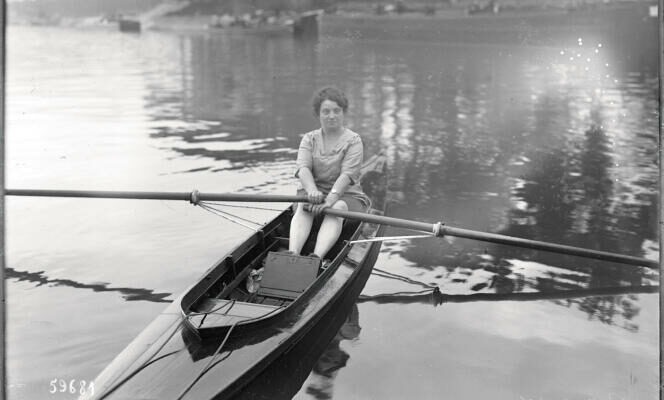The newsletter of M The magazine of the World gets a new look. To subscribe for free, go here.
These are the forgotten Olympic Games. Besides, this Olympiad doesn’t even have a number. Say if it doesn’t count! And yet… On August 20, 1922, at the Pershing stadium, in the Bois de Vincennes, the first women’s Olympic Games took place. More than seventy international sportswomen compete in a handful of disciplines, for a day, in front of twenty thousand spectators, half-curious, half-joking, and a few dubious journalists – or downright mocking, for them… Whatever : these sports adventurers have just opened a breach.
The initiative for this event came from a French woman: Alice Milliat (1884-1957). This great figure has long been neglected in sports historiography. But today heiresses are trying to revive the memory and the work, taking advantage of the coming of the Games in Paris. A biography, Alice Milliat, the Olympic woman, by Sophie Danger (Editions Les Pérégrines), is due out on April 19.
Another book, Thanks Alice, to be published on May 2, collects portraits of this pioneer and seventy-nine Olympic or Paralympic champions written by eighty women (the work is co-published by the Alice Milliat Foundation and The Team). A documentary film festival, Sportives en Lumière, is to be held in Montreuil (Seine-Saint-Denis), from March 7 to 9. Conferences are also organized. Rich news which allows us to honor this extraordinary personality.
The contemptuous veto of the IOC
From Nantes, Alice Million, who became Milliat after a short-lived marriage to Joseph, who died when she was only 24, is an accomplished rower and swimmer who makes her living from translations and working as a shorthand typist. Very quickly, she becomes manager of a women’s sports club and comes up against those who see it as heresy. Patron of the embryonic French Federation of Women’s Sports, founder of the International Federation of Women’s Sports, she tried after the First World War to gain recognition, particularly in the main discipline of athletics, for the full presence of women. during the Games.
The International Olympic Committee (IOC) casts a contemptuous veto. It would be unfair to attribute to Pierre de Coubertin, its president and founder, the exclusivity of a misogyny anchored in society. In an article published in 2019 by History review, the historian Florence Carpentier perfectly recreates the action of Alice Milliat in the phallocratic atmosphere of the time and in the context of the feminist struggles of the moment. “Yes, women have the right to sport! Don’t come and put forward this old commonplace that she has to stay at home to mend socks…”, storm the pioneer, on February 5, 1927, during a conference.
You have 50% of this article left to read. The rest is reserved for subscribers.
